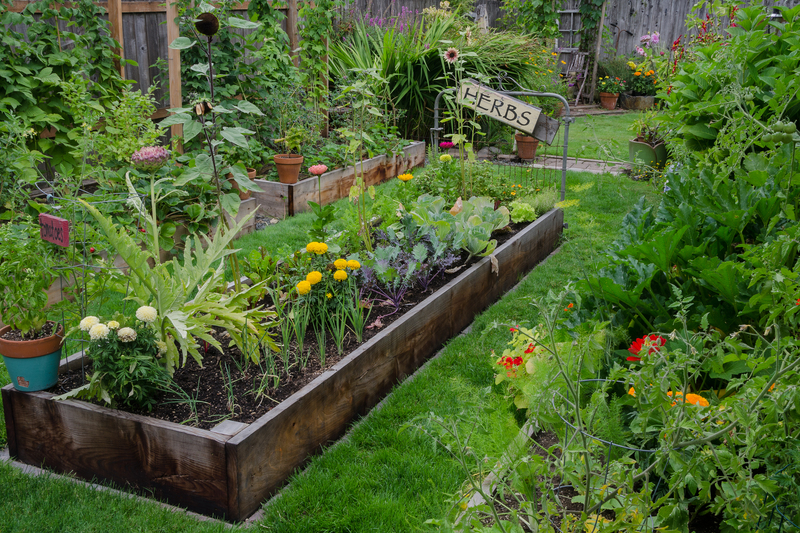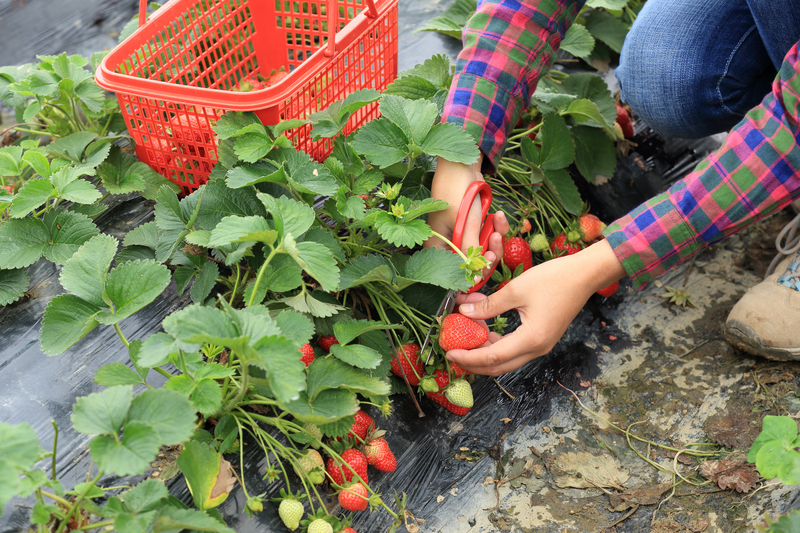The Essentials of Herb Gardening for Novice Growers
Posted on 27/08/2025
The Essentials of Herb Gardening for Novice Growers
If you're looking to start a rewarding journey into herb gardening, you've chosen a hobby that is both satisfying and highly beneficial. Whether you have extensive outdoor space or are limited to a small balcony or sunny windowsill, herb cultivation can suit your lifestyle. This comprehensive guide explores the essentials of herb gardening for novice growers, covers a wide range of herb gardening tips, and provides everything you need to grow flavorful, aromatic herbs at home.
Why Start an Herb Garden?
Herb gardening is popular among beginning gardeners for good reasons. Herbs are quick to grow, easy to maintain, and highly useful in the kitchen and beyond. Here are some of the primary benefits:
- Fresh, organic ingredients at your fingertips for culinary creations.
- Enhanced fragrance and aesthetic appeal for your home or garden.
- Many herbs are natural pest repellents, acting as companions to other plants.
- Cost-effective: Buying fresh herbs can be expensive--growing them is a budget-friendly choice.
- Wellness boost: Many herbs have medicinal properties and support well-being.

The Best Herbs for Beginner Gardeners
If you're new to growing herbs, it's wise to begin with varieties that are hardy, forgiving, and fast-growing. Here's a list of popular herbs for beginner gardeners:
- Basil - Ideal for salads, pastas, and pizzas. Needs warmth and plenty of sunlight.
- Mint - Extremely easy to grow, superb for teas and desserts. Best grown in pots to prevent spreading.
- Parsley - Very hardy, ideal for flavoring soups and sauces.
- Chives - Compact, great for windowsills, wonderful in eggs and potato dishes.
- Rosemary - Aromatic and drought-tolerant. Perfect with roasted meats and veggies.
- Thyme - Low-maintenance, complements a wide variety of savory dishes.
- Cilantro (Coriander) - A staple in Mexican, Indian, and Asian recipes.
- Oregano - Perfect for Italian and Mediterranean cuisine. Hardy and prolific.
Your Herb Selection: Factors to Consider
Choose herbs you frequently use in cooking. Consider their growing habits--some like mint can overwhelm nearby plants if not contained. Pay attention to sunlight and water requirements for each herb plant to ensure a thriving garden.
Planning Your Herb Garden
Before you start planting, take time to plan your herb garden layout and select a suitable site for herb cultivation. The right location is vital for growth and yield.
Container vs. Ground Herb Gardens
- Container Herb Gardening - Ideal for small spaces and easy to manage. Pots can be moved to catch sunlight.
- In-Ground Herb Beds - Suitable for yards or raised beds. Allows for more variety and larger yields.
If you're a beginner, container gardening is the simplest option. Start with small pots or a window box to manage herbs effectively.
Light and Space Requirements
- Most herbs require at least 6 hours of sunlight daily. South-facing windows or balconies are ideal.
- Ensure each herb has adequate room to grow. Crowding inhibits growth and increases disease risk.
Soil and Potting Essentials for Herb Gardening Beginners
Understanding soil needs is essential for thriving herbs. Herbs generally prefer loose, well-draining soil with moderate levels of organic matter. Avoid heavy, clay-based soil that can suffocate roots.
- Use a premium potting mix while growing herbs in pots.
- For outdoor beds, amend soil with compost and ensure it drains freely after rain or watering.
- Avoid chemical-laden fertilizers. Instead, opt for organic compost or slow-release natural fertilizers.
- Ensure containers have adequate drainage holes to prevent root rot.
Planting and Caring for Your Herb Garden: A Novice's Guide
Starting Herbs from Seeds vs. Seedlings
- Seeds - More economical and offer greater variety, but require patience and careful care during germination.
- Seedlings - Convenient and quick, perfect for impatient or first-time gardeners.
For most new herb gardeners, purchasing young plants or starter herb kits is the easiest route.
Step-by-Step Planting Instructions
- Fill pots or beds with moist, well-draining potting soil or garden mix.
- If using seeds, plant at the depth specified on the seed packet (usually 1/4 inch deep).
- For seedlings, gently remove from starter pots, loosen roots, and position at the same depth as original potting.
- Water lightly after planting, ensuring the soil is moist but not soggy.
- Label each herb to avoid confusion, especially when seedlings look similar.
Watering Your Herbs
- Most herbs like the soil to dry slightly between waterings. Over-watering causes root rot, especially in pots.
- Water in the morning to reduce risk of mold and allow leaves to dry by evening.
- Always check moisture by sticking your finger into the soil (should feel just barely dry before watering again).
Feeding Your Herbs
- Feed with a balanced, organic fertilizer monthly during the growing season.
- Too much fertilizer causes herbs to lose their rich flavor--moderation is key.
Pinching and Pruning: Encouraging Growth
- Pinch off flower buds to encourage leaf growth, unless harvesting seeds is your goal.
- Regularly trim the tips of stems (harvesting leaves) to encourage bushier, fuller plants.
Dealing with Common Herb Gardening Problems
As a beginner, you'll likely encounter a few herb gardening challenges. Here's how to prevent and solve some typical pitfalls:
- Pests: Aphids, spider mites, and whiteflies can be deterred with neem oil or insecticidal soap. Growing mint, basil, and chives near other plants helps repel problem insects naturally.
- Diseases: Avoid overwatering. Good air circulation and sunlight reduce mold and mildew risk.
- Yellow leaves: Usually a sign of overwatering or poor drainage. Check container holes and soil moisture.
- Leggy Growth: Insufficient sunlight causes herbs to grow tall and weak. Move pots to a sunnier spot or supplement with grow lights.
Harvesting and Storing Herbs
How to Harvest Your Herbs for Best Flavor
- Harvest in the morning, after dew dries but before full sun for peak flavor and aroma.
- Snip leaves or stems with sharp scissors or garden shears.
- For perennial herbs like rosemary and thyme, remove only a third of the growth at any time.
- Annual herbs like basil can be harvested continuously once they reach 6-8 inches tall.
Storing Your Herbs
- Use fresh as much as possible for best taste and nutrients.
- Drying herbs: Tie sprigs and hang upside down in a dark, well-ventilated place. Store in airtight containers.
- Freeze in small portions (chopped and stored in ice cube trays with water or olive oil) to preserve flavor for months.
Creative Ways to Use Homegrown Herbs
Your herb garden will provide fresh flavor for recipes, but don't stop there! Consider these creative uses:
- Herb-Infused Oils and Vinegars - Delicious for salad dressings and marinades.
- Herb Teas - Fresh mint and chamomile make healthy, calming beverages.
- Herbal Butter - Compound butters with basil, chives or parsley are perfect on bread and steaks.
- Natural Remedies - Calendula, sage, and lavender have healing properties for skin and wellness.
- Pest deterrent - Rub basil or mint leaves on skin as a natural mosquito repellent.

Troubleshooting: Frequently Asked Questions for Beginner Herb Gardeners
How often should I water my herb plants?
Let soil partially dry out between waterings. Most herbs prefer soil that's moist but never soggy. Always check the soil first.
Why are my herbs turning yellow?
Common causes include overwatering, lack of sunlight, or nutrient deficiencies. Adjust your care accordingly.
Can I grow herbs indoors?
Absolutely! Choose a sunny windowsill or supplement with grow lights for year-round fresh herbs.
How do I keep herbs from getting leggy?
Ensure at least 6 hours of sun daily and pinch growing tips to encourage bushy growth.
Can I regrow herbs from kitchen cuttings?
Herbs like basil, mint, and oregano root readily in water or moist soil. Snip a healthy stem and place it in water until roots form, then plant in soil.
Conclusion: Enjoy the Rewards of Your Herb Garden
Herb gardening for beginners is the ideal way to jump into cultivation without overwhelming yourself. Herbs thrive in a variety of spaces, require minimal maintenance, and provide a wealth of delicious and health-promoting benefits. By following the essentials of herb gardening outlined above, you'll enjoy a beautiful, productive herb garden--no matter your level of experience. Happy growing!
Latest Posts
Privacy Upgrade: Explore 9 Fast-Growing Hedge Options
Discovering Joy in a Kid-Friendly Garden Design
Winter Fortress: Ensuring Garden Plant Health



